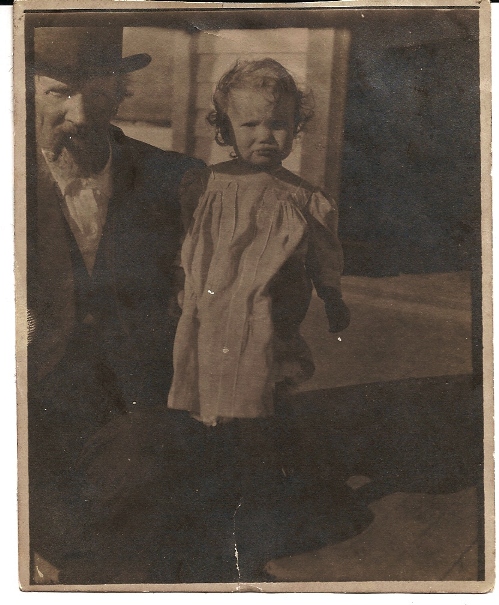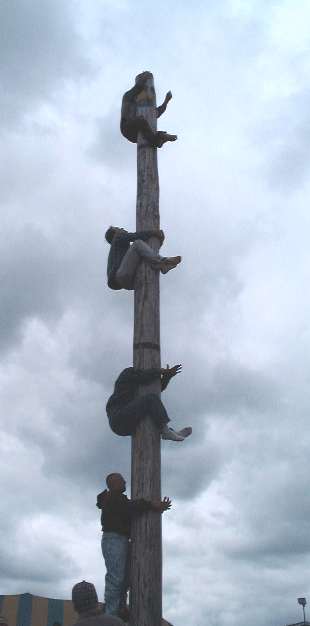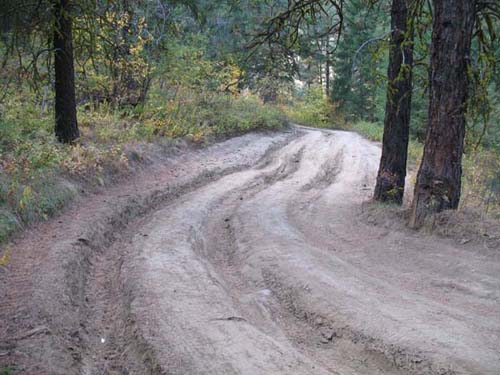|
|
Now one thing Grandpa Billy also loved doing in his last years was to ride out to his farm in fine weather and watch the fields being worked. To combine getting a lift there and having a raised place from which to watch, he’d have a chair put on a wagon, then ride it out. One day his grandson John was tasked with plowing 20 acres to plant field corn. Young John carefully assisted Grandpa Billy up a short ladder to the wagon, saw him settled safely in the chair with his pipe, then climbed onto the big gasoline-powered tractor and slowly drove down the road to the field. When they got there, John disconnected the wagon in a shady spot, hooked up the plow, and set to work while Grandpa Billy relaxed with his pipe. When John stopped to check on his Grandpa after finishing his job, he noticed a wisp of white smoke curling up from a burlap sack in the wagon bed. Unknown to Grandpa, a bit of his pipe ash had fallen on the sack. And what made matters worse was that a gas can was sitting next to the sack! When he saw the imminent danger, young John first thought of his Grandpa and helped him move to safety. Then he asked Grandpa Billy if he should move the can and extinguish the smoldering sack. Grandpa just looked at him and dryly said “Yep; I do think that might be a good idea.” (John still laughed when he told that, more than 70 years later.) How Cousin John’s Corduroys Won the Day When he was a boy, Cousin John was given a pair of new corduroy pants by his mother. In those days, money was very short (In rural America the Great Depression started in 1920), and a pair of pants was an investment – in fabric and time and labor, if nothing else. The first day he wore the pants, John got caught up in the excitement of a local festival in which one of the events was a greased pole climbing contest. The person who could first climb the debarked, heavily greased, pole to the top would retrieve a dollar (equivalent to at least $20 today).
The Greased Pole Climb Contest had been so popular and generated so much excitement and interest, someone said it should be repeated. This time only a 50 cent piece was placed at the top (no one recorded how the money was gotten there). Newly confident from his recent victory and still wearing the now very greasy corduroys, John won again! As he told me, he took $1.50 home that evening, in his still new, but very soiled, corduroys. No word on what his mother said, but she probably washed the pants without complaint, proud of her boy’s feat, and happy at her part in it. Cousin Percy Cousin Percy couldn’t handle a car because he was, as the saying went, “a bit off”, though perfectly capable of independent living. So he walked everywhere. He was a strong walker. One day, as he was walking from the county town to his home far out in the countryside, Percy was spotted by a friend who was driving carefully along the same rough, rutted road.
Percy always wore bib overalls with a rough work shirt for his everyday attire. The last time I saw him, at the cemetery on Memorial Day many years ago, that’s what he had on. Just recently my Aunt Mary told me Percy’s funeral had been open-casket. And there in the casket lay Percy, wearing crisply starched and pressed bib overalls and work shirt. Most everyone thought it was the best choice that could have been made for his burial suit. They would not have recognized him otherwise. How Cousin John Became a Lawman by Accident Born in 1920, my cousin John was in the prime age group of young men who served in World War II. He got through the war safely, then saw the common sense of taking advantage of the generous government program that paid veterans to get college educations, even though he’d only completed two years of high school before dropping out to work on local farms. John lived 21 miles from the nearest college – a teacher’s college in Pittsburg, Kansas. Too poor for a car, all he had for transportation was a war-surplus Harley Davidson motorcycle. So every school day he would get up at dawn and ride the distance, on poor roads, go to classes, then return to his home in rural Missouri. Rain or shine, hot or cold weather, even on snow and ice.
One day that happened to be icy, he had made it safely to Pittsburg and was rolling down a main street, almost to school, when he hit a slick spot while trying to make a 90-degree turn onto a side street. The bike, refusing to turn, skidded some distance; but he “didn’t even have to set his foot on the pavement” and recovered neatly – according to him, not a particularly difficult feat. However, just behind him on the street, a following car happened to be full of Pittsburg policemen carpooling to work that morning. They had been quite impressed by his cycling skill. At the first opportunity, one of them approached him and suggested he could have a job right away as a motorcycle policeman with the city. John responded that he already had a full-time job as a student, and a particularly demanding job at that, as he was having to make up for his truncated high school education. A few weeks later, however, when the offer was made once more, John thought again about the decision and figured he might try it for awhile. Twenty-five years later John retired from a career as motorcycle “cop” in Pittsburg (he’d worked his way up to Captain), only to be talked into running for county sheriff – an office he won by a 2 to 1 margin and stayed at until he retired for good. All because of an icy patch on the ride to class, a smooth recovery, and a lucky chance. Lots of Johns, Some Firecrackers, and Grandpa’s Stable The other phone number I’d called that day (and gotten an answering machine) had been my cousin Linda, in upper New York State. Linda and I had not spoken in nearly 60 years; and there was a reason for that. Back in the early 1950s all of Mom’s family were gathered at Grandpa’s house in Missouri (Grandpa John), including my Uncle Jack (actually also named John), his daughter Linda, and his son, also named John. Not much imagination in my family about names. It was the Fourth of July; and in small-town Missouri 60 years ago there were no restrictions on fireworks. Anything went. (I trace the start of my lifelong high-frequency deafness, especially in my right ear, to careless play with firecrackers at Grandpa’s house.) Being 10 years old and utterly without discretion or sense, I formed an idea – I would talk my younger cousin John into conspiring with me at frightening his even younger sister – Linda – by luring her out to Grandpa’s stable (empty of horses, but not of straw) and setting off a string of firecrackers. Took real brains to think of that. (I did mention the straw, right?) Of course Other John, being also a boy (even younger than me) and equally shy on good sense, went along. Our little plot went beautifully. Linda – not much older than nursery school age – totally trusted her brother and cousin (both “honest Johns” no doubt), followed us, listened to our improvised tale of noisy monsters, then (when the firecrackers went off on schedule), ran terrified and shrieking back to Grandpa John’s house where our fathers and mothers and uncles and aunts and dozens of cousins were gathered. As I said to Linda (when she finally returned my call, and after I apologized, 60 years late, for my stunt), I have never, in my nearly 70 years, been bawled out by so many people at once. Or so richly deserved it. Grandpa John’s stable, in case you wondered, did not burn down. No thanks to me. Getting to the Point, with a Caution My family’s get-togethers have always been filled with tales like these – told around campfires, coffee pots, dinner tables, backyards, front porches. Everybody tries to take part. But most of the tales have never been written down; and when the thread from one generation to another finally frays, they will be lost. Hence the title on this column – WRITE IT DOWN! Already a couple of my cousins have joined with me in an effort to record some of the family lore. A tape recorder can be used (with permission), then the contents transcribed, verified with the source, shared with those who can’t attend reunions, and preserved for future generations. Those with ambition, skill, and resources can even put the best stories into a family “book” of lore. It’s so easy to share printed materials via the Internet nowadays, preparing simple books has become feasible. But DON’T WAIT. Take every opportunity, right now, to preserve your family’s stories. Just try to use discretion about which ones get promulgated, however. Some family stories, inevitably, get some family members mad, as they so often appear to be told, at least in part, to embarrass someone. My Dad’s family, for example, had a classic tale about the night the game warden chased my uncle around the outside of his house a half-dozen times, trying to catch him red-handed with some poached prairie chickens. We all laughed every time we heard it – all of us except my uncle. I doubt he would have enjoyed seeing THAT story in print. Some times you just have to consider people’s sensitivities. ©2010 John I. Blair Click on author's byline for bio and list of other works published by Pencil Stubs Online.
|







